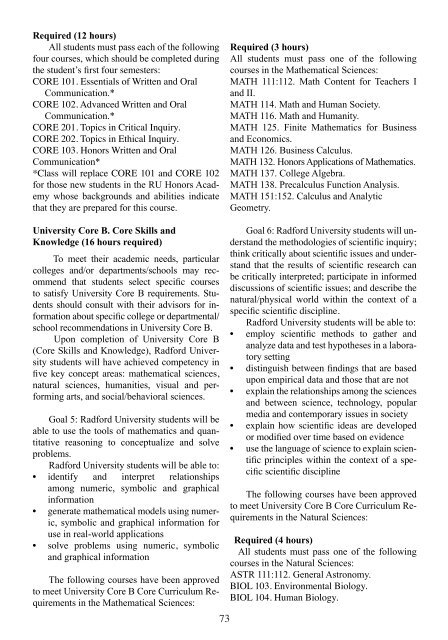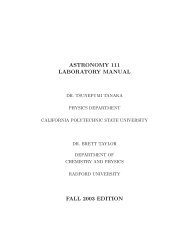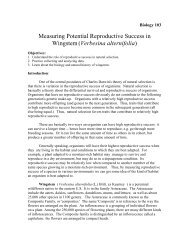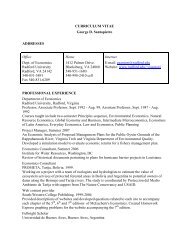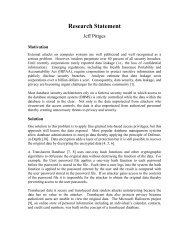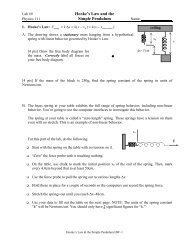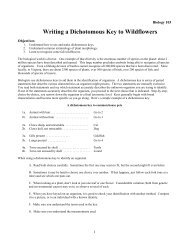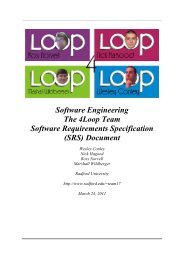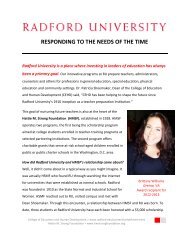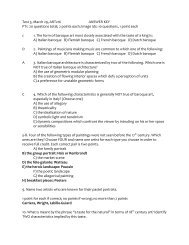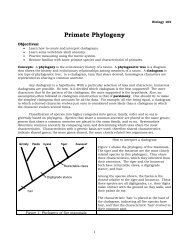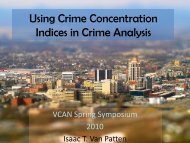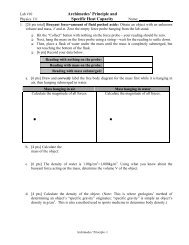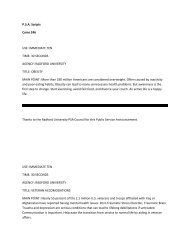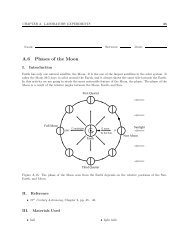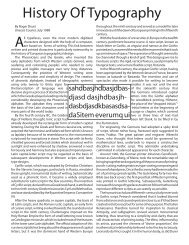- Page 1 and 2:
2011-2012 Undergraduate Catalog
- Page 3 and 4:
Contents Academic Calendar 3 Degree
- Page 5 and 6:
Calendar Fall Semester 2011 2012 20
- Page 7 and 8:
COLLEGE OF VISUAL AND PERFORMING AR
- Page 9 and 10:
University Presidents John Preston
- Page 11 and 12:
Commission on Collegiate Nursing Ed
- Page 13 and 14:
Admissions Admission to Radford is
- Page 15 and 16:
IB EXAMINATION MIN. SCORE RADFORD U
- Page 17 and 18:
General Chemistry 50 CHEM 101, 102
- Page 19 and 20:
Transfer Students Students wishing
- Page 21 and 22:
Fees and Financial Aid University E
- Page 23 and 24: Unpaid Tuition Fees or Fines Failur
- Page 25 and 26: a refund of the enrollment deposit
- Page 27 and 28: The student has a right to know:
- Page 29 and 30: this program of up to $5,500 annual
- Page 31 and 32: of Graduate and Professional Studie
- Page 33 and 34: Campus Life Numerous cultural and e
- Page 35 and 36: additional information about the LE
- Page 37 and 38: proof of ownership (by the student
- Page 39 and 40: concerns. Counselors can also assis
- Page 41 and 42: Access to the full range of Radford
- Page 43 and 44: RU Express Card Students may use th
- Page 45 and 46: A notarized letter of sponsorship a
- Page 47 and 48: INST 489G. Study Abroad Practicum i
- Page 49 and 50: Academic Policies Responsibility of
- Page 51 and 52: class attendance policy should ask
- Page 53 and 54: Conversion of “I” and “ON”
- Page 55 and 56: Unsuccessful attempts at challenge
- Page 57 and 58: policy for withdrawals resulting fr
- Page 59 and 60: student’s advising center or the
- Page 61 and 62: made after the last day to withdraw
- Page 63 and 64: c. the student indicates how and wh
- Page 65 and 66: dent may want to restrict their dir
- Page 67 and 68: covered by those courses previously
- Page 69 and 70: Participation and Graduation Studen
- Page 71 and 72: above, option semester hours are in
- Page 73: Political Science (p. 156) Psycholo
- Page 77 and 78: • use social or behavioral scienc
- Page 79 and 80: SPAN 101:102. Beginning Spanish. SP
- Page 81 and 82: PROFESSIONAL PROGRAMS Pre-Law Progr
- Page 83 and 84: hours of honors coursework in accor
- Page 85 and 86: ACCREDITATION The graduate and unde
- Page 87 and 88: ACCOUNTING, FINANCE AND BUSINESS LA
- Page 89 and 90: (ECON majors cannot use both ECON 1
- Page 91 and 92: Electives 23 Total Credits Needed f
- Page 93 and 94: College of Education and Human Deve
- Page 95 and 96: (College of Humanities and Behavior
- Page 97 and 98: RETENTION POLICIES After admission
- Page 99 and 100: APPALACHIAN STUDIES Theresa L. Burr
- Page 101 and 102: B.S. DEGREE EXERCISE, SPORT AND HEA
- Page 103 and 104: ESHE 363. Seminar in Professional F
- Page 105 and 106: HLTH 453. Human Sexuality. 3 HLTH 4
- Page 107 and 108: NUTRITION AND DIETETICS MAJOR The c
- Page 109 and 110: ASIAN MARTIAL ARTS MINOR 16 ESHE 26
- Page 111 and 112: RCPT 421. Ropes Course Programming.
- Page 113 and 114: concentrations have specific requir
- Page 115 and 116: Required Courses in Professional Ed
- Page 117 and 118: Childhood Special Education. 9 EDEC
- Page 119 and 120: Requirements 15 EDSP 361. Introduct
- Page 121 and 122: Waldron College of Health and Human
- Page 123 and 124: COSD 401. Neuroanatomy in Communica
- Page 125 and 126:
carry out these roles. Professional
- Page 127 and 128:
The application process for the Sch
- Page 129 and 130:
NURS 352. Mental Health Nursing. 5
- Page 131 and 132:
SOCIAL WORK MAJOR CORE CURRICULUM R
- Page 133 and 134:
PROGRAM OF STUDY (RHEC SITE) The pr
- Page 135 and 136:
College of Humanities and Behaviora
- Page 137 and 138:
assistance for all students in the
- Page 139 and 140:
Core: Language study in Japanese 8
- Page 141 and 142:
for the various positions within cr
- Page 143 and 144:
Required Courses 9 CRJU 320. Crimin
- Page 145 and 146:
B.A. OR B.S. DEGREE ENGLISH MAJOR A
- Page 147 and 148:
All majors in modern foreign langua
- Page 149 and 150:
Students who have taken a foreign l
- Page 151 and 152:
East). Students may not count any o
- Page 153 and 154:
LEADERSHIP AND MILITARY SCIENCE UND
- Page 155 and 156:
Required Courses (27 hours) Philoso
- Page 157 and 158:
Electives Students should consult w
- Page 159 and 160:
(This does not include STAT 200 whi
- Page 161 and 162:
Political Science 12 • POSC 120.
- Page 163 and 164:
MINORS SOCIOLOGY MINOR (18 semester
- Page 165 and 166:
Required Courses: 24 COMS 114. Publ
- Page 167 and 168:
providing both theoretical and aest
- Page 169 and 170:
CINEMATIC ARTS INTERDISCIPLINARY MI
- Page 171 and 172:
College of Science and Technology J
- Page 173 and 174:
*Declared biology majors must earn
- Page 175 and 176:
BIOL 215. Plants and Society. 4 BIO
- Page 177 and 178:
AFFILIATED CLINICAL HOSPITALS IN ME
- Page 179 and 180:
ments for both Radford University a
- Page 181 and 182:
BIOL 231. Genetics, Evolution, and
- Page 183 and 184:
BACHELOR OF SCIENCE IN COMPUTER SCI
- Page 185 and 186:
Information Technology 27 ITEC 320.
- Page 187 and 188:
ACTG 212. Fundamentals of Manageria
- Page 189 and 190:
B.A. OR B.S. DEGREE MATHEMATICS MAJ
- Page 191 and 192:
will also take MATH 260, MATH 346,
- Page 193 and 194:
courses, students have the option o
- Page 195 and 196:
The Forensic Science (FS) Minor is
- Page 197 and 198:
Required Courses Outside Geospatial
- Page 199 and 200:
Core Courses above and fulfill all
- Page 201 and 202:
PHYS 421. Electromagnetic Theory I.
- Page 203 and 204:
College of Visual and Performing Ar
- Page 205 and 206:
experimental photography, portfolio
- Page 207 and 208:
General Electives 26-32 Students sh
- Page 209 and 210:
*ART 215. Art History Survey: Prehi
- Page 211 and 212:
INTERIOR DESIGN & FASHION Holly L.
- Page 213 and 214:
DSNI Core 53 DSNI 103, 125, 200, 20
- Page 215 and 216:
DSN Design Support Courses 12 DSN 2
- Page 217 and 218:
MUSIC Al Wojtera*, Chairperson http
- Page 219 and 220:
TRANSFER STUDENTS INSTRUMENTAL OPTI
- Page 221 and 222:
Total Credits Needed for Degree: 12
- Page 223 and 224:
ART 200- 300- or 400 level studio c
- Page 225 and 226:
Dance Core 55 Theory Requirements:
- Page 227 and 228:
THEA 475. Theatre Problems. 3 THEA
- Page 229 and 230:
Course Identification, Courses The
- Page 231 and 232:
ACTG 411. Federal Taxation. (3) Thr
- Page 233 and 234:
ANSC 302. Principles of Biological
- Page 235 and 236:
ANSC 497. Seminar in Archaeological
- Page 237 and 238:
oad cultural context. The course co
- Page 239 and 240:
emphasis on design and craftsmanshi
- Page 241 and 242:
ART 493. Museum Internship. (MS) (3
- Page 243 and 244:
ASTRONOMY ASTR 111. General Astrono
- Page 245 and 246:
ATTR 420. Therapeutic Modalities. (
- Page 247 and 248:
animal development. Laboratory expe
- Page 249 and 250:
BIOL 392. Environmental Toxicology.
- Page 251 and 252:
200 may be taken concurrently) This
- Page 253 and 254:
science majors. CHEM 101 and 102 ha
- Page 255 and 256:
COLLEGE OF HEALTH AND HUMAN SERVICE
- Page 257 and 258:
academic field and work opportuniti
- Page 259 and 260:
COMS 300. Media History. (3) Three
- Page 261 and 262:
development of specialized communic
- Page 263 and 264:
Addresses the nature of conflict be
- Page 265 and 266:
COSD/EDSP 225. Communication Proces
- Page 267 and 268:
CORE 103. Written and Oral Communic
- Page 269 and 270:
CRJU 370. Crime and Criminal Behavi
- Page 271 and 272:
DNCE 201. Pointe Technique. (2) Fou
- Page 273 and 274:
DNCE 465. Dance Production. (3) Two
- Page 275 and 276:
DSNF 205. Sophomore Studio II. (3)
- Page 277 and 278:
DSNI 375. Design Theory and Researc
- Page 279 and 280:
major contemporary issues. Students
- Page 281 and 282:
This course deals with the applicat
- Page 283 and 284:
Designed to provide pedagogical con
- Page 285 and 286:
prospective middle level teacher de
- Page 287 and 288:
theories of applied behavioral anal
- Page 289 and 290:
without disabilities. Includes the
- Page 291 and 292:
ple disabilities, and orthopedic im
- Page 293 and 294:
and limited participation; culminat
- Page 295 and 296:
ENGL 321. The Study of Fiction. (3)
- Page 297 and 298:
ENGL 433. Renaissance Literature. (
- Page 299 and 300:
literary, biographical, historical
- Page 301 and 302:
for the assessment of the component
- Page 303 and 304:
through secondary school-aged young
- Page 305 and 306:
equirements, a minimum 3.5 GPA in a
- Page 307 and 308:
or “B” for the final project. C
- Page 309 and 310:
FOSC 211/ANSC 211. Forensic Archaeo
- Page 311 and 312:
Introduction and demonstration of t
- Page 313 and 314:
GEOL 474. Hydrogeology. (4) Three h
- Page 315 and 316:
GEOG 280. Regional Geography. (SS)
- Page 317 and 318:
GEOS 493. Planning Techniques. (3)
- Page 319 and 320:
HIST 302. War in the Modern Age (A,
- Page 321 and 322:
HIST 341. Early Modern Europe (B) (
- Page 323 and 324:
in such diverse activities as histo
- Page 325 and 326:
HLTH 362. Community Health, Disease
- Page 327 and 328:
INST 488. International Studies: Se
- Page 329 and 330:
oth program completion purposes and
- Page 331 and 332:
ITEC 120. Principles of Computer Sc
- Page 333 and 334:
asic technologies, tools and method
- Page 335 and 336:
ITEC 442. Data Warehousing, Mining,
- Page 337 and 338:
LATN 315. Advanced Grammar. (3) Thr
- Page 339 and 340:
MATH 142. Discrete Mathematics. (3)
- Page 341 and 342:
several variables, including standa
- Page 343 and 344:
MGNT 361. Organizational Communicat
- Page 345 and 346:
MKTG 360. Professional Selling. (3)
- Page 347 and 348:
MSCI 212. Developing Leadership Ski
- Page 349 and 350:
MUSC 102. Fundamentals of Music The
- Page 351 and 352:
Shaping features of texture, timbre
- Page 353 and 354:
MUSC 350. Percussion Techniques. (2
- Page 355 and 356:
MUSC 418. Arranging and Orchestrati
- Page 357 and 358:
egularly scheduled to enhance the p
- Page 359 and 360:
NURS 362. Nursing Research. (2) Two
- Page 361 and 362:
performance-based project.) In orde
- Page 363 and 364:
Project and the topic to be explore
- Page 365 and 366:
number of specific issues within co
- Page 367 and 368:
PHYS 221:222. Physics.* (4:4) Three
- Page 369 and 370:
POSC 120. Introduction to American
- Page 371 and 372:
POSC 432. Public Organization Theor
- Page 373 and 374:
with the goal of enhancing students
- Page 375 and 376:
neuronal functioning and communicat
- Page 377 and 378:
PSYC 478. Research in Physiological
- Page 379 and 380:
RCPT 326. Leisure and the Aging Pro
- Page 381 and 382:
tourism industry is influenced by g
- Page 383 and 384:
RELN 310. Exploring the Old Testame
- Page 385 and 386:
This course has been approved for C
- Page 387 and 388:
SOCY 411. Appalachian Cultures. (3)
- Page 389 and 390:
skills, explore opportunities, and
- Page 391 and 392:
Integrates the student’s knowledg
- Page 393 and 394:
e given special attention in a chro
- Page 395 and 396:
STAT 499. Internship in Statistics.
- Page 397 and 398:
epeated for up to four (4) semester
- Page 399 and 400:
WOMEN’S STUDIES WMST 101. Women i
- Page 401 and 402:
Faculty The following is a list of
- Page 403 and 404:
Stanton,* Angela D., Associate Prof
- Page 405 and 406:
Daniel, Leslie S., Assistant Profes
- Page 407 and 408:
Smith,* Lauren, Assistant Professor
- Page 409 and 410:
Burke,* Tod W., Associate Dean and
- Page 411 and 412:
Ryder, John G., Instructor of Histo
- Page 413 and 414:
Schwartz, Howard D., Professor of S
- Page 415 and 416:
Burkhardt, Cindy A., Professor of C
- Page 417 and 418:
Brockway, Jack W., Associate Profes
- Page 419 and 420:
Kats,* Nitza, Associate Professor o
- Page 421 and 422:
Boggess, Robert K., Professor Emeri
- Page 423 and 424:
Gregory, Russell I., Professor Emer
- Page 425 and 426:
Milton,* Janet S., Professor Emerit
- Page 427 and 428:
Whitaker,* Mack L., Professor Emeri
- Page 429 and 430:
Public Relations Concentration.....
- Page 431 and 432:
Interdisciplinary Minor in Health a
- Page 433:
Table of Contents..................


